
AP
NATO harshly condemned the aid convoy's unauthorized entry into Ukraine, and said for the first time that it had evidence of direct Russian military involvement in Ukraine. The European Union commission urged Russia to "reverse its decision." The Pentagon told Russia to "remove its vehicles immediately."
But the "or else" threats from the West have been piling up for months in the Ukrainian crisis. And Putin suspects that Ukraine will not fire on the convoy, which would give Russia a pretext for more direct intervention.
He also knows the European Union and U.S. are unlikely to do anything about it, as they are looking to calm tensions in the region and for a possible ceasefire. Putin and Ukrainian President Petro Poroshenko are scheduled to meet next week in Minsk, Belarus, the first time the two will have met face-to-face since June. It's the best chance in a while European leaders have seen to defuse the crisis.
"Meanwhile, Russia has been losing on the military front in southeast Ukraine. So the advantage to Russia is to get the humanitarian convoy in and sit there, making it much more difficult for the Ukrainian government to defeat the separatists. The separatists, in turn, can take the time to rearm and reorganize," Bremmer told Business Insider in an email.
"Putin just called Ukraine's bluff...and Ukraine (wisely, in my view) has chosen not to attack the convoy. But that means what we've known all along. Putin was never going to allow Ukraine to 'win' this conflict. We're back to the long game."
And the long game, for Putin, is maintaining a direct influence over Kiev without a direct invasion. It includes continuing to train and arm the pro-Russian separatists to keep up the military pressure on Ukraine, while its economy continues to teeter on the brink of collapse. A Russian military invasion continues to be "Plan B."
The key question in the aftermath of the aid convoy's unauthorized entry is whether the E.U. and U.S. will be willing to increase sanctions on Russia. But Bremmer expects they won't do that before Tuesday, when Putin and Poroshenko are scheduled to meet.
"You have a meeting planned in a few days between Putin and Poroshenko. The Europeans seriously want to deescalate the crisis if they can, and that's the best opportunity they've seen," Bremmer said.
"Granted, Russia has ignored all of the west's warnings to date - sending more military material and now pushing their humanitarian convoy into Ukraine without international agreement. The U.S., Europe, and NATO have all warned Russia not to do that 'or else,' but the 'or else' has gotten them precisely nothing to date."